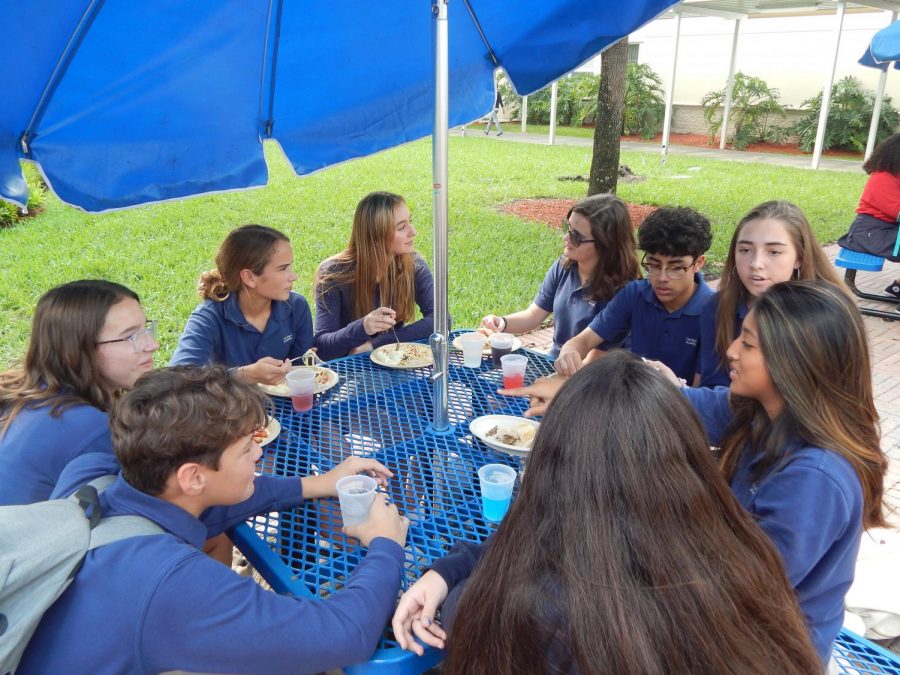High school can be the best years of a person’s life but it does have its challenges. One of these challenges is maintaining relationships, especially as students begin to grow and develop their individual interests. Unhealthy relationships are not only bad for a person emotionally, but they can also lower academic performance. Maslow’s Hierarchy of Needs also points out that in order to achieve self-actualization, a person needs to have positive relationships with people. That’s why it’s important for students to maintain healthy relationships throughout their high school years in order to grow into a happier, healthier, smarter human being. To get some relationship advice, I’ve asked some of this year’s freshmen (Chiara Laus, Kailee Scott, Blake Foley, and Zebulun Kovach) some questions on high school friendships and how to maintain them in a healthy manner.
The first question was, how do you know who your friends are?
“A friend is someone you value that is there for you when you need them and that can truly be trusted,” says Zebulan, “They are the people you are with most of the time on a daily basis.”
Similarly, other students have emphasized trust in defining friendships as well. An important lesson to be learned from this is that in order to be a good friend it is necessary to avoid gossip at all costs, as gossip is a leading cause for the loss of trust.
Speaking of social media, one of the questions on friendship involved just that. The question is, is social media really helping friendships, or hindering them?
“It’s a little bit of both,” says Chiara, “when you’re apart from your friends, social media and technology can help you stay connected. Although, when people are together they still tend to use social media and tech around their friends, which can hinder a relationship.”
“Social media is definitely more of a hindrance than a help,” says Kailee, “because assumptions made based on posts can be so dangerous.”
“I think that social media helps friendships,” says Blake.
“I think social media helps with staying connected over the summer,” says Zebulun.
It’s true that social media can help friends stay connected when they are apart, but there are many things to be careful about, too. It’s not good to make assumptions about people based on their social media. Social media platforms can be very distorted and not an accurate portrayal of who a person is, and as Chiara pointed out, it’s not healthy for people to always have their social media when they hang out. As technology progresses, more and more things are done online, from going to school to dating, but there is nothing healthier for a person socially than hanging out in person, and TKA has been a big help with this by banning phone use during lunch, promoting real, meaningful conversations.
The third question concerns friendships with age gaps. In most cases, students are divided primarily by age, with some exceptions based on academic ability, and students tend to gravitate naturally towards students the same age as them. The question is, do age gaps actually matter in a friendship?
“I believe that age gaps do not really make a difference in a friendship,” says Blake, “because a friend is a friend and you can overlook that.”
“I think age gaps can be obstacles because relating with others on things is hard when you don’t share similar life experiences,” says Kailee, “However, age gaps can also be beneficial because an older person can be a mentor to someone younger, and oppositely, the younger person can help the older one get out a fixed mindset.”
Both Kailee and Blake had excellent points. While age gaps can pose as obstacles, ultimately, they should not inhibit friendships, and hanging out with people at different periods of their life can help promote an open mindset.
The next question was about peer pressure. Many have heard the old adage, if your friends all went and jumped off a bridge, would you? These words make peer pressure seem silly, but it might be a bigger issue then we realize. Is peer pressure a prevalent issue or just something adults overreact about?
“I believe that peer pressure is definitely a thing,” says Chiara, “and is something that’s very serious in our generation. For example, if people want to be friends with a type of group that does a certain thing they could get peer pressured into doing that thing so that they could be cool or fit in. But it’s not something that should happen, and if it does happen, then they are hanging out with the wrong group of people.”
As Tim Ferris says, you are the average of the five people you associate with the most, so do not underestimate the effects of your pessimistic, unambitious, or disorganized friends. I believe his words are an excellent reminder to us that we should make sure that the people we hang around every day are positive influences, not negative ones.
The last question that I asked was, what is the best way to be a good friend to someone? Once you have a clear idea of what to avoid in a relationship, it’s good to know how to proceed in your relationships moving forward so that they can grow.
“It’s the little things that someone can do for you, “says Chiara. “For example, wait for you after class or remember something that you told them that is typically unimportant. The way I feel loved, which varies from other people, is when people make an effort for you. It truly means a lot.”
Hopefully, this article will help you to maintain healthy relationships in your life, even if you aren’t high school quite yet or have graduated from it long ago. As people, we instinctively desire connections with others, but a little help with that here and there never hurt anyone.
Rework conclusion-Approved JC

